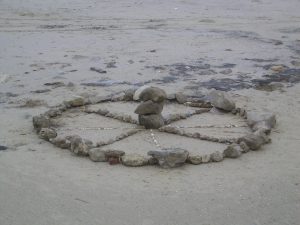They passed through Weatherford-the seat of Parker County, where the worst of Peta Nocona's raids had taken place-and then stopped in Fort Worth, where Cynthia Ann became an instant celebrity. It is not known why the travelers stopped here. Some accounts say it was to have a photograph taken, but the first known photograph of her-a tintype, actually-was not taken until a month later in Austin.28 Whatever the reason, her arrival caused a great commotion as residents of Tarrant County (who totaled 6,020 that year) clamored to see the famous captive and her child. Her arrival was considered such an important event that the local children were let out of school. They came in groups to gawk at the terrified captives, who were on display in front of a general store in downtown Fort Worth. It was a sort of freak show: Cynthia Ann was bound with rope and set out atop a large box so that everyone could see her. One can only wonder what role her uncle Isaac, politician that he was, played in it. According to one witness: She was not dressed in Indian costume but wore a torn calico dress. Her hair was bronzed by the sun. Her face was tanned, and she made a pathetic figure as she stood there, viewing the crowds that swarmed about her. The tears were streaming down her face, and she was muttering in the Indian language.29 Texans could not get enough of her. There were many newspaper accounts of her return, all of which were uniformly obsessed with the idea that a pretty little nine-year-old white girl from a devout Baptist family had been transformed into a pagan savage who had mated with a redskin and borne his children and forgotten her mother tongue. She was thus, according to the morals of the day, grotesquely compromised. She had forsaken the virtues of Christianity for the wanton immorality of the Indian. That was the attraction. And all the stories assumed that everything she had done had been forced upon her. That she had suffered grievous mistreatment, had been whipped and beaten and had led a lonely and desperate existence. People simply did not believe that a Christian white woman had gone along with it voluntarily. One paper, the Clarksville Northern Standard, observed later that "her body and arms bear the marks of having been cruelly treated."30 Yet there is nothing to suggest that she was cruelly treated after the first few days of her captivity, as her cousin Rachel Plummer had described them. She was the ward of a chief, later his wife. The scars may have resulted from the practice among Comanche women of cutting themselves in mourning, often on the arms and breasts. Apparently no white people wanted to think too hard about the implications of the lovely mixed-race girl named Prairie Flower, whom her mother obviously adored.
After the carnival interlude in town, the party continued to Birdville. Here Isaac lived in a spacious "double log" cabin that was considered for many years the finest house in Tarrant County. It is not clear exactly what he thought he was going to accomplish with Cynthia Ann and her daughter. Perhaps he was simply doing what he considered to be his family duty. Perhaps he saw himself as her deliverer, imagining the day when Cynthia Ann, grateful and weeping, would embrace Jesus and forsake her savage ways.
Nothing of the sort happened. Cynthia Ann's repatriation was in fact a disaster. She was not only unrepentant. She was actively, and incessantly, hostile to her captors. She tried repeatedly to escape with her daughter, sometimes making it far into the woods and requiring a search party to find her. She was so intent on leaving that Isaac had to lock her in the house when he was away. As her legal guardian, he was empowered to do so. Cynthia Ann was being treated as though she were crazy: An entirely "free" white woman, thirty-three years old and from a prominent family, was being forcibly restrained so that she could not return to her sons and the culture that raised her. Her family believed that, owing to a life in which they assumed she had been sexually abused and beaten and enslaved, she was unable to know what was best for her. Cynthia Ann, meanwhile, always had a clear and quite correct sense of her own interests. Such treatment must have been terrible to endure.
She could not, or would not, speak English, though in any case what she remembered would have been rudimentary. She would sit for hours and hours on the wide porch of Isaac's house weeping and nursing Prairie Flower. She refused to stop her pagan devotions. One of her relatives described her ritual of worship:
She went out to a smooth place on the ground, cleaned it off very nicely and made a circle and a cross. On the cross she built a fire, burned some tobacco, and then cut a place on her breast and let the blood drop onto the fire. She then lit her pipe and blowed smoke toward the sun and assumed an attitude of the most sincere devotion. She afterwards said through an interpreter that this was her prayer to her great spirit to enable her to understand and appreciate that these were her relatives and kindred she was among.The family and neighbors retaliated by demanding that Cynthia Ann and Prairie Flower give up wearing Indian clothing and insisting that Prairie Flower be given instruction in Scripture. Cynthia Ann was uncooperative. Things did not go well.
S.C. Gwynne, from Empire of the Summer Moon: Quanah Parker and the Rise and Fall of the Comanches, the Most Powerful Indian Tribe in American History

No comments:
Post a Comment